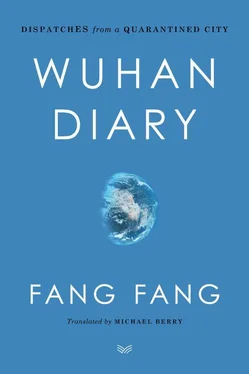An old classmate from Beijing posted a question in our online chat group asking what was going on with the 18th Command issued by the Wuhan Outbreak Prevention Control Center. Someone who understood the situation immediately responded by explaining that the 17th Command had been a mistake and now they were correcting it. The 18th Command was sent out to supersede the 17th Command. The old saying “bad news travels fast” is spot-on. In barely any time at all I saw a professor posting his interpretation of what happened, using the old idiom “Issue an order at dawn and rescind it at dusk.” He even said that this wasn’t even a true case of “issuing an order at dawn and rescinding it at dusk,” it was “issuing an order at dawn and rescinding it before noon!” My god, the whole country has their eyes on Wuhan and yet we keep insisting on making silly mistakes; it can be so frustrating.
Doctors are still doing everything they can to save those patients infected early on whose condition has now turned quite serious; however, the mortality rate for these patients is still quite high. From this you can see that once the coronavirus reaches a critical stage it becomes extremely hard to treat; whether one lives or dies is completely dependent on the patient’s ability to fight the virus. Medical practitioners are doing a much better job of preventing mild cases from taking a turn for the worse. I heard that some of the patients admitted to the temporary hospitals don’t want to leave even after they have recovered! Those temporary hospitals are extremely spacious, they provide excellent food, and even have entertainment areas so patients can sing and dance! So the patients love being there for the social benefits. The hospital takes care of everything for you while you are there and, most importantly, it’s all free. So a lot of people would prefer to stay there than being cooped up alone at home. The whole thing is so strange that it almost sounds like a bad joke.
The main task at hand is to control the outbreak so it does not spread any further; it is also the most difficult task we are facing. Although the new political leaders who are overseeing things here in Wuhan have ordered a thorough census to get a better sense of where things stand, even that is a complicated and challenging task in a large sprawling city with more than nine million residents. You need to mobilize community workers, local cadres, and even university teachers and each one has to go door-to-door to dozens, hundreds, in some cases even a thousand households to conduct surveys and collect information, all the while running the risk of getting infected themselves. And they have absolutely no recourse when they encounter residents who are resistant or refuse to open the door for them. They can’t call the police to intervene; the police are already stretched too thin. It is hard enough for these community workers and public officials to get their hands on enough face masks, let alone protective biosuits. A few days ago one of my colleagues from the Hubei Writers Association called to see if I knew anyone who might be able to help him get a biosuit. It is extremely difficult to guarantee the safety of these workers and volunteers when they go into those districts with extremely high infection rates. If they get infected and then go home and spread the virus to their own families, it will be even worse. But it will be even far worse if we don’t find everyone who falls into those four categories and ensure that they are all either properly quarantined or receiving treatment. The city will never be able to reopen until we do that. And in order to prevent the further spread of this disease, it is of the highest priority that we go door-to-door to every household in Wuhan.
This afternoon one of my old classmates from Beijing sent a recommendation from Zhang AD who graduated from the same department as me in 1977. According to AD, the massive numbers of asymptomatic carriers has created a huge hurdle for the country when it comes to managing this outbreak and preventing further spread. He grew extremely anxious thinking about this today and came up with a recommendation that he was hoping I could share with my readers. After reading it, I thought it might be useful, so I am including his comments below:
My recommendation: Have the state mobilize China’s three largest telecommunications companies (China Telecom, China Mobile, and China Unicom) to contact every cellphone user in the country and send out a notification establishing a National Emergency Response Network. Similar to the QR Code Health System already employed in cities like Hangzhou and Shenzhen, every person will be required to do a daily health check-in. Besides the three big telecommunication companies, we will also need the two largest private e-pay companies (WeChat Pay and Alipay) to sign on. Through the network created by these five companies we can cover the vast majority of China’s 1.4 billion residents. Those people without cellphones or without an e-pay account are highly unlikely to be living in areas where mass outbreaks are occurring. Elderly people can be contacted through their family members. If we add the Shenzhen company DJI and other top drone companies into the mix (employing them under the National Emergency Response Network), we can use their drones to patrol virus zones. These drones can also deliver announcements, send out broadcasts, and conduct surveillance while minimizing human contact. They can also increase work efficiency when it comes to quickly identifying all potential cases. This must be implemented as soon as possible.
Another important benefit of using WeChat Pay and Alipay is that we can not only pinpoint the whereabouts of carriers, but we can also track down everyone they had close contact with during a given time frame (from November 1, 2019, until now). We will be able to track everyone using this system!
I copied the above text directly from AD; I’m not sure if it is practical, but I’m putting it out there for specialists to consider. AD’s father is actually the lyricist of the famous song Yellow River Cantata , Zhang Guangnian. [34] Zhang Guangnian (1913–2002), also known as Guang Weiran, was a Chinese poet and military leader. He joined the Chinese Communist Party in 1929. He wrote the poem that would become the basis for the lyrics of the Yellow River Cantata ( Huanghe dahechang ) in 1939. He also served as editor of People’s Literature ( Renmin wenxue ).
(As a matter of coincidence, my colleague Dao Bo, whom I wrote about before, has an aunt who is the composer of Yellow River Cantata , Xian Xinghai.) Back when I served as editor of Celebrities Today magazine, I once serialized several selections from Zhang Guangnian’s diary. Later, when he published his diary as a book, he sent me a copy. Inside the book was a letter in which he mentioned the fact that his son AD was actually my classmate. Since Mr. Zhang is such a senior figure I didn’t think it would be appropriate for me to directly respond to his letter, so I never wrote back. At the time I was quite young and had very high expectations for myself; I didn’t want to be perceived as someone taking advantage of the fact that I was editing a magazine about celebrities to try to get close to them. Instead, I always tried to keep a respectful distance from the famous people we featured. But later when I learned that Mr. Zhang had passed away I really regretted never having written back to him.
This afternoon I read a report by a journalist with Caixin Media about the situation that many retirement homes and nursing homes are dealing with amid this coronavirus outbreak. Even without the outbreak, the elderly are already in a particularly weak and marginalized place in society. I suspect that a lot of them live in circumstances that are already well below the average, compared with most people in China today. But once this virus started hitting many healthy young people, you can only imagine what it is doing to the elderly.
Читать дальше



![О Генри - Закупщик из Кактус-Сити [The Buyer from Cactus City]](/books/405348/o-genri-zakupchik-iz-kaktus-thumb.webp)








